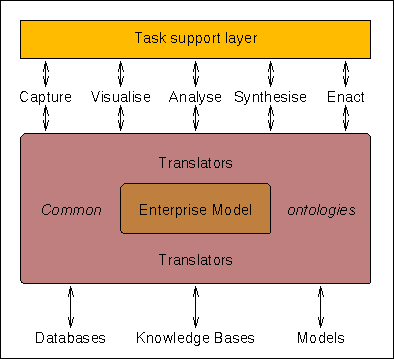Overview of the Enterprise Project

- Partners:
-
The consortium is led by AIAI and includes
IBM UK, Lloyd's Register, Logica and Unilever.
- Problem:
-
Businesses have a need to increase their relative and absolute performance.
This need is brought about by a combination of factors both internal and
external to the business. Examples of such factors are
the needs to: improve customer satisfaction;
improve financial performance; decrease cycle times; and
adapt to growth and recession cycles.
To achieve successful management of change,
businesses need to be able to monitor and improve their performance against
strategic objectives.
This ability needs to be supported by methods and tools
which help model, analyse and improve various aspects of how a business
works and how it is organised.
- Solution:
-
To improve and where necessary replace existing modelling methods
with a framework for integrating methods and tools which are appropriate to
enterprise modelling and the management of change.
The Enterprise project is aimed at providing a
method and computer toolset which will help capture
aspects of a business and analyse these to identify and compare
options for meeting the business requirements.
- Main Features:
-
The framework for integrating methods and tools will be solidly based
on an ontology for enterprise modelling.
It will
support a generic core of practical knowledge based modelling
tools and methods for business application and will
be developed in accordance with existing and
emerging standards in open systems
and knowledge representation.
The Toolset
This will provide task management support to users by helping them to perform enterprise modelling activities and guiding them through the toolset facilities. The toolset will enable:- capture and description of an enterprise (e.g. its processes, strategy, organisational structure, resources, goals, constraints and environment), through the development of an object-oriented notation with graphical support;
- specifications of business problems/requirements, in harmony with the ontology, and also with graphical support;
- identification and evaluation of solution options and alternative design and implementation paths at strategic, tactical and operational levels;
- representations for the definition of relevant metrics and advanced simulation support.
Public Deliverables
The benefits of the project will be delivered to the wider business community by the partners themselves. There are three key public deliverables:- a review of the state of the art in enterprise modelling techniques, tools and methods;
- the development of two early demonstrators using off-the-shelf software;
- a demonstrator of the toolset applied to a generic business problem.
- Technical Details:
-
An important focal point for the project will be
the assessment, specification and implementation of interfaces between
the Enterprise toolset and existing decision support and modelling tools.
The tools
and methods to be integrated and enhanced will be
based on a number of key standard methods and recently developed
technologies, including object-oriented requirements
capture, design and development, knowledge-based plan representation,
multi-agent problem-solving and open architectures.
The project will also pay particular attention to the integrability of deliverables with established business modelling approaches (two targets being IBM's BSDM and the IDEF methods) and current management support systems. The main technology areas to be addressed are:
- knowledge representation and domain ontologies
- knowledge interchange
- process modelling and application of plan representations
- strategic planning.
- Development Effort:
-
Budgetted at over £2.6 million, Enterprise is the UK's major
initiative to support organisations effectively in the Management of Change.
The inclusion of the end-user organisations Lloyd's Register, Unilever and IBM will enable the evaluation of the toolset in the context of real business applications. Lloyd's Register will use the results for more effective modelling and re-engineering of business processes for strategic planning. Unilever will initially use the toolset within its R&D activities. IBM UK intends to exploit the results in modelling its own internal organisation as well as providing technical input via its Business Modelling Method BSDM (Business Systems Development Method). Logica's work will be concentrated in the early stages of the project, addressing how pragmatic methods and current commercial tools can be used to support business process re-engineering. AIAI, as the main developer of the toolset, brings a world-leading technical capability in KBS technology and applications to the consortium. The project is part funded by the UK Department of Trade and Industry under its Intelligent Systems Integration Programme (ISIP).
 AIAI information
AIAI information